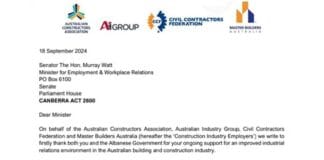The CFMEU’s (Construction, Forestry, Mining and Energy Union) defiant stance against signing enterprise agreements that comply with the anti-union “Building Code” came to an abrupt end in August.
After federal Labor’s move to strike the laws down in the Senate failed, the union has rushed to sign code compliant agreements, particularly in Victoria and NSW. The union is demanding a big boost to penalty rates and pay to extract a high price from the construction bosses, while they pin their hopes on a future Labor government repealing the law.
This is a flawed strategy. Construction workers know only too well that “waiting for Labor” didn’t work last time, and the Rudd Labor government left the ABCC anti-union police force in place. The union leadership’s back-down is also a slap in the face to the tens of thousands of workers who defied threats from the ABCC and risked fines to walk off the job for two rallies this year against the Code.
Those rallies showed the power to beat Turnbull and his anti-union laws.
The Building Code legislation requires companies that want to tender for federal government building contracts to be “code compliant”, gutting hard-won conditions.
Code compliant agreements remove controls over casualisation, rostered days off, union flags and even notice-boards. Clauses that ensure the relevant unions can enforce the agreement are outlawed, allowing non-union “workers’ representatives” to be inserted where unions are not well organised.
The union could have called Turnbull’s bluff in early June in NSW. A strong majority of the 100 workers at Boral subsidiary, De Martin & Gasparini, voted to reject a code compliant agreement. In September the Federal Court ruled that Boral’s threat to sack the workers was illegal and fined the company. Boral workers’ stand could have been the beginning of industry-wide action against the construction bosses and Turnbull’s war on workers.
The CFMEU is attempting to “box clever” by signing agreements that only run until July 2018, in the hope that Labor will win the next election, and by raising casual loadings to 80 per cent after six weeks on the job, to keep a lid on casualisation.
But code compliance will spread worsening conditions throughout the industry, widening the gap between union and non-union sites.
The CFMEU have been at the forefront of the fight against Turnbull’s war on workers. Dropping the fight against the Code is a setback. But we can still win the war. We still need to keep up the militancy and fight on every site and workplace.
Unions NSW has called a stopwork rally on 16 November. It will be industrial action that can defy the law, beat the ABCC and beat Turnbull.
By Jean Parker





